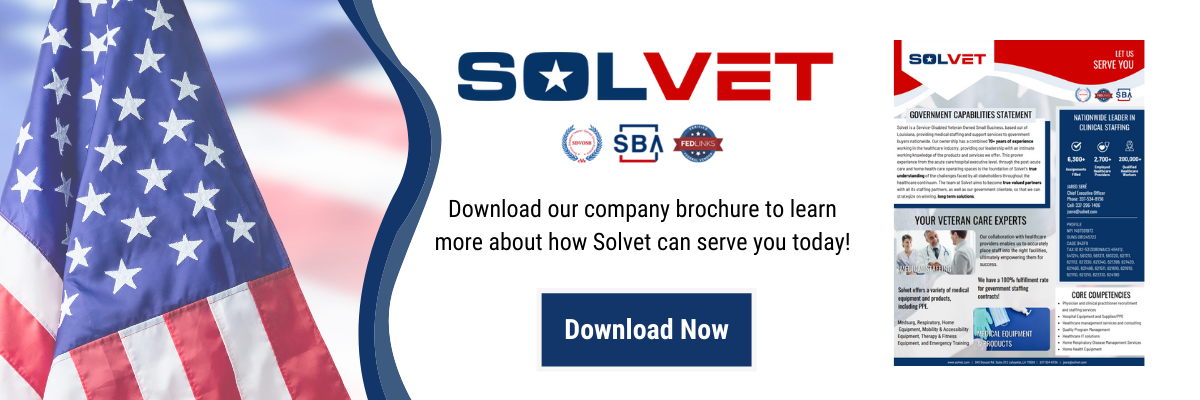5 min read
Healthcare Best Practices During COVID-19
By: Solvet Services on Aug 11, 2021 12:09:25 PM
.png)
To date, COVID-19 has been the most devastating pandemic in history. Healthcare providers and staff are still trying to recover from the long and grueling hours of providing care for patients with symptoms ranging from fever to severe respiratory distress, and in some areas, the end of it all does not seem to be so near.
Medical staff have been stretched thin as work days and weeks increase, all while they try to maintain their own personal lives at home. Healthcare professionals are facing uncertainty and change as we push to be able to move beyond COVID-19, but it's important to take the time now to implement some healthcare best practices that will be helpful for the future.
Operations and Detailed Processes
1. Worker Safety and Support
Being that healthcare workers are our first defense when it comes to overcoming this pandemic, it is important that they understand and execute current infection prevention and control (IPC) practices for COVID-19. To do this, ensure that your healthcare staff are well-trained on the use of personal protective equipment (PPE).
Develop protocols for your health care staff to monitor themselves for fever and symptoms of COVID-19, restrict them from work when sick or post exposure, and to safely allow return to work after an exposure and/or suspected or confirmed COVID-19 infection. Lastly, establish a plan for providing additional support for HCP, considering aspects such as mental health support, meals, non-punitive sick policies, etc.
2. Facility Practices
Strengthen your facility’s response mechanisms by becoming familiar with pandemic, COVID-19 specific, and crisis standards of care. To do this, consider using a hospital preparedness checklist and the COVID-19 Surge spreadsheet to estimate and respond to the surge in demand for hospital-based services. Create plans to reduce staffing shortages and assess the need for alternative care sites, such as emergency field hospitals.
3. Communications
Develop and maintain a communication plan for your medical personnel, patients, and the community. Consider including virtual town halls, daily huddles with local leadership, calls with partners, emails and phone conferences for staff, media briefs, and others. In desperate times like these, communication is essential to providing the most comfort and assurance possible to all involved.
full staffing to avoid employee burnout
Between May and October of 2020, using the AMA Coping with COVID-19 for Caregivers Survey, 20,947 health professionals from 42 health care organizations across the U.S. assessed their workers’ stress during the pandemic. The survey found that 61% of those surveyed felt high fear of exposing themselves or their families to COVID-19 while 38% self-reported experiencing anxiety or depression. Another 43% suffered from work overload and 49% had burnout.
To help combat employee burnout in healthcare during these testing times, it's important to pay attention to the basic needs of the healthcare workers in your clinics. This can be as simple as providing healthy food that is easily available, promote health and wellness with IV therapies, creating a clear streamline of communication between healthcare employees and departments, providing peer support programs, and normalizing seeking professional help if needed. Ensuring the mental and physical wellness of your medical staff is a crucial part in making sure they are well equipped to take on the demanding pressures of the work they do every day.
In addition to these things, making sure your hospitals and clinics are fully staffed to be able to provide the best clinical care can greatly reduce the feeling of burnout in the medical work place. Solvet has experience credentialing staff with established procedures to help fulfill our client's needs. With medical oversight and a 94.6% employee retention rate, we ensure that all parties involved are satisfied.
Learn more about our staffing resources .
Disaster Response Plan
While hospitals and healthcare systems have devised and tested disaster response strategies for anticipating mass casualty events, the COVID-19 pandemic has lasted much longer than anticipated. Building and maintaining relationships with public health professionals will continue to be vital and a valuable resource for obtaining needed resources like clinical staffing assistance and personal protective equipment.
That's where we come in. As a veteran-owned and operated business, we can provide you with the medical equipment, staffing, supplies, and support services you need to make sure your disaster response plan runs smoothly and efficiently.
supply chain
Solvet Service's internal PPE team rigorously vets potential vendors with strict criteria based on FDA, CE, and other quality standards including CDC, NIOSH, AAMI, AANSI, and ASTM. Based on rapidly changing market demand and trends, we offer "on the ground stock" items so that they are readily available for customers to keep a consistent supply chain and to have quicker ship times. In order to keep your hospitals and medical clinics operating at it's full potential, it's important to stay prepared and stay stocked with essentials like personal protective equipment at all times.
LEARN MORE
Related Posts
Everything You Should Know When Hiring Medical Staffing for Veterans
Who We Are
Here at Solvet, we strive to be the best at what we do. Our primary focus is making sure...
Everything You Need to Know About Home Respiratory Services
The Importance of Home Respiratory Services
Having access to home respiratory care is not quite a...
The Importance of Personal Protective Equipment (PPE)
What is PPE?
Personal protective equipment, also referred to as "PPE", is equipment worn to...



.png?width=740&name=Solvet%20Contact%20US%20CTA%20(7).png)